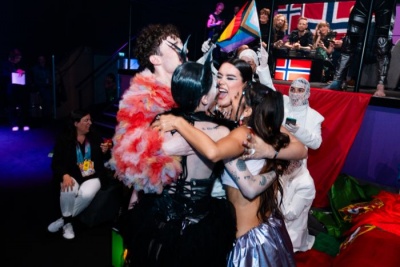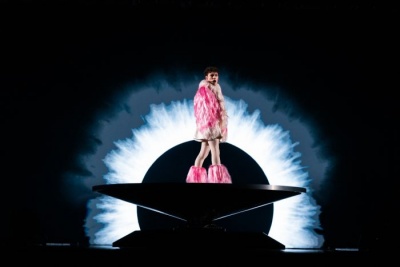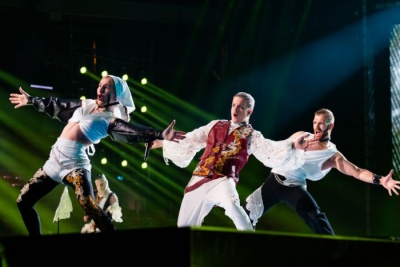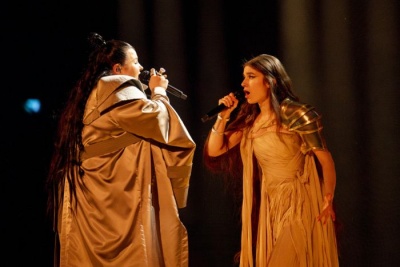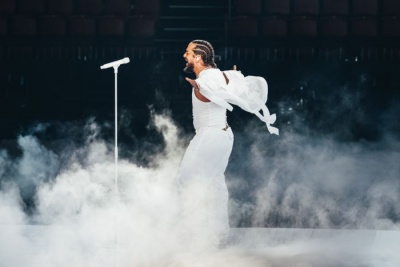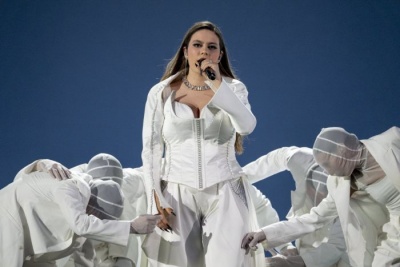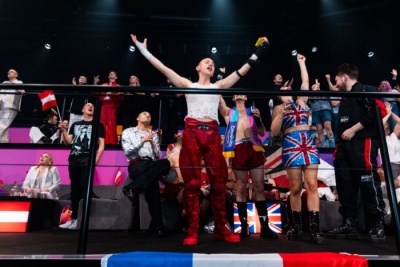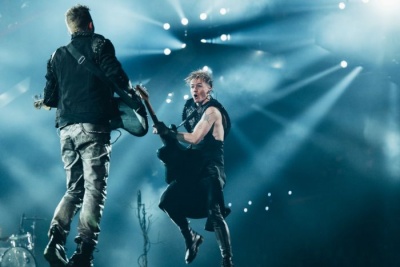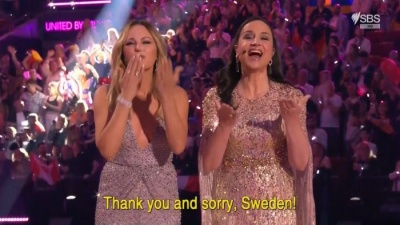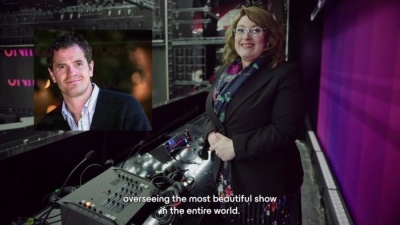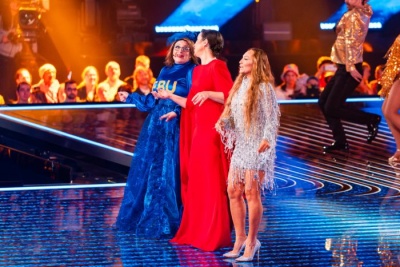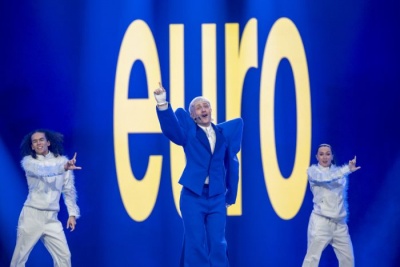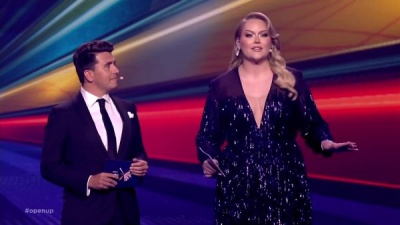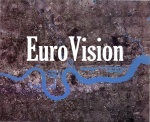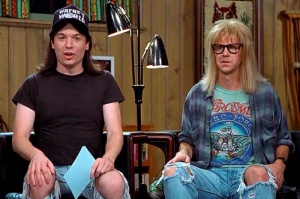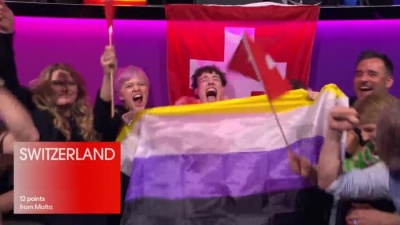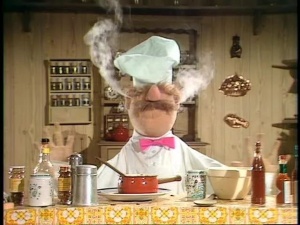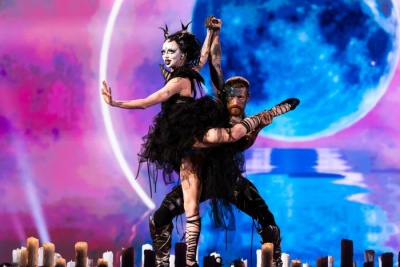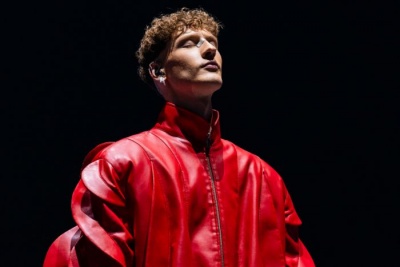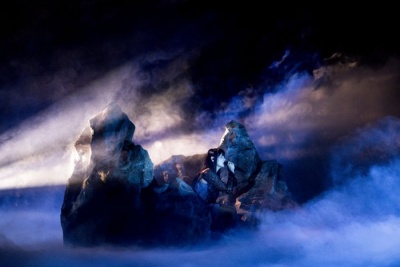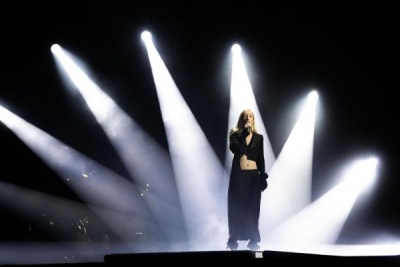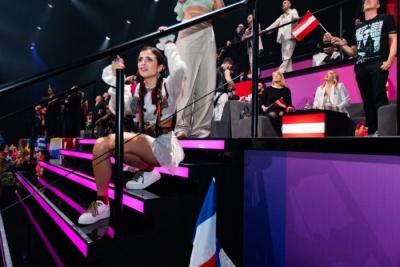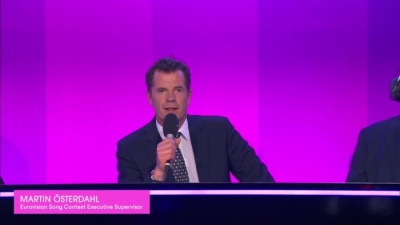Weaver's Week 2024-05-19
Last week | Weaver's Week Index | Next week
At the BAFTA Television Awards, game shows bagged a lot. Strictly Come Dancing was the best Entertainment show, Celebrity Race Across the World won in Factual Entertainment. Squid Game: The Challenge took the Reality category. And the best Live Event Coverage went to Eurovision Song Contest 2023. Congrats to all involved, the BAFTAs are television's most prestigious awards.
Which awards will this year's contest win?
Eurovision Song Contest 2024
Best Winner Who Looks a Bit Like Bagpuss (Especially If You're Not Watching While Sober)
"The code" won the Eurovision Song Contest 2024. Written by Benjamin Alasu, Lasse Midtsian Nymann, Linda Dale, and Nemo Mettler; and performed by the solo singer Nemo, "The code" represented SRG SSR (shown on screen as "Switzerland").
Back in the 1960s, The Beach Boys made "Good vibrations". The song goes places, mashes up pop and doo-wop and surf and howling experimental feedback. Ten years later, Queen recorded "Bohemian rhapsody", a mixture of wig-out rock and opera and bolero and close-harmony singing. Both songs are recognised as classics of musical brilliance.
"The code" covers just as much ground, from pop to opera with a side-order of rap, and a hint of many other musical styles. Performed with the benefit of a small rotating platform, Nemo impressed with their vocal physical agility, running across the stage like the hounds of hell were about to be unleashed. But this was very carefully choreographed chaos, the camera always knew where to point.
It's a celebration of finding yourself, of breaking out of the little boxes society imposes on you. Nemo is a non-binary person, they are neither male nor female. Confused? Consider a world where everyone is pigeon-holed into "blonde" or "brunette", then imagine having red hair – or no hair at all. Nemo sings with joy and abandon: their happiness is contageous, radiates joy through the television screen and into your living room.
And, as a song, it's genius. You know the old verse-chorus structure? Forget it. "The code" is prelude, rap, operatic bridge, chorus. Each section more epic than the last, until Nemo is in quite the emotional frenzy by the end. We've listened to the song a fair few times, and there's still an awful lot to unpack: the songwriting is exceptionally masterful. Every note, every syllable has a purpose.
To no surprise, "The code" won the jury vote by a country mile, almost 150 points ahead of its nearest rivals. Although it finished fifth in the televote, the overall result gave a victory by 591 to 547.
Rest of the leaders
"Rim tim tagi dim" won the televote, just over 100 marks clear of "The code". Composed by Marko Purišić, it was performed by him under the stage name Baby Lasagna, and represented HRT ("Croatia").
The song's very catchy, techno-pop with a metal edge. It benefited from a group performance with strong choreography. If you look into the lyric (and nobody ever looks into the lyric), the song has a sharper edge, being all about someone leaving his homeland for unknown parts.
We very nearly didn't get the televote winner – it only crept into HRT's national final Dora after someone else withdrew. But like R Ben in ITV's Superstar, like David Sneddon in Fame Academy, the last entrant into the competition got goodwill from the public and then proved its musical worth. Great musical worth, the song both captured attention on first listen and repaid further listens.
"Teresa & Maria" came third for alyona alyona and Jerry Heil (UA:PBC, "Ukraine"). Evoking the legend of two saints, the women perform a song about how even the greatest saints begin life as mundane people, and that we can all bring about the change we want to see. Emotional and powerful because it channelled energy. Third place overall: third in the televote but a fairly distant fifth in the jury vote.
"Mon amour" finished fourth for Slimane (France Télévisions, "France"). The vocals were perfect, and Slimane showed the benefit of spending six months with his song. What we didn't dare expect was the way Slimane would get intimate with the camera. It added a new dimension to the song, Slimane felt like he was personally expressing his love for us, making eye contact and even a little boop on the camera's chin. It was charming and sexy, though shouldn't have been too disheartening for the straight blokes watching. Second place with the juries, and fourth with the televote, but such was the gap to the jury leader that "Mon amour" finished fourth overall.
Other songs of note
An excellent result for Bambie Thug, "Doomsday blue" finished sixth in both elements, and sixth overall. A strong and coherent staging, a strong and well-considered song, and justly rewarded by all concerned. Sure, it's a divisive entry, too avant-garde for some viewers, too blasphemous for some jurors. Nevertheless, sixth place is a spectacular result for RTÉ ("Ireland"), and demonstrates that taking risks often pays off.
Often, but not always. "La noia" (Angelina Mango for RAI "Italy") had a costume change to black dance outfits, which seemed to take a little of the energy out of the performance. Or maybe it was overshadowed by "Jako" (Ladaniva for AMPTV "Armenia"), a sunny and vibrant song of pure joy and freedom, like the wind passing through your hair on a pleasantly sunny summers' day.
"Grito" (iolanda for RTP "Portugal") brought monochrome artpop into the top ten. "Always on the run" (Isaak for ARD/NDR, "Germany") was set in a burning building; tenth with the juries – and 12th overall – is much better than any ARD entry in the past few years. RTL "Luxembourg" came back, "Fighter" by Tali ended up 13th, and the team celebrated with their first Douze Points since 1990. A big surprise came when "No Rules!" only scored a handful of televote marks: we expected Windows95Man (YLE "Finland") would be ignored by juries, but not to be scorned by the general public. We appear to have evolved past the need for gimmick songs.
"Dizzy" (Olly Alexander for BBC, "United Kingdom") took forever to get off the mark, but staged a late charge up the jury table to finish 13th. The televoters rewarded the song with the grand non-total of 0 points. And … we have no idea how this happened. The song wasn't exceptional, but the staging was memorable – camera trickery in a gymnasium, filled with Olly and his boxing chums. We haven't seen people dressed as boxers in donkey's years.
What went wrong? We're not sure. The staging was very clever, using rotational cameras and all sorts of angle trickery to make it look like Olly and co were dancing on the ceiling at one point. Perhaps it's too clever, too disorienting. Certainly the dancers didn't come across as particularly visual, and watching on replay we can see that some were slightly out of time with others. And there were quite a lot of uptempo male vocals this year: in a female-friendly contest like 2022, "Dizzy" would have stood out and been rewarded.
We said in our preview that this song was a Hit. We stand by that judgement, even though televoters rejected it. Olly Alexander has shown other major stars that Eurovision is a valid career move: in the last five months, he's gained a lot of attention and honours, culminating in a Gold Blue Peter badge. The BBC have continued on their up-and-down path to Eurovision success, and up-and-down is inevitable at Eurovision. The Beeb may be carving out a niche of Audacious Staging – file "Dizzy" alongside "Space man", and last year's Junior entry "Back to life", memorable presentation.
"Unforgettable" came ninth for Marcus and Martinus (SVT "Sweden"). Last place overall went to NRK "Norway", their entry "Ulveham" from Gåte didn't click with anyone. (Well, it clicked with this column: we also voted for "The code", "Mon amour" "Grito", "Jako", and "Veronika".)
Least Unpredictable Script
For the third time in little more than a decade, the senior contest was organised by SVT, with Petra Mede hosting. First time was a charm, second was more of the same, and this time was more of the same again. The show felt a little stale and predictable; as much as we chuckled at Edward af Silen's script, when it's not being borderline homophobic (if you're a Eurovision fan you're gay, ha ha ha) there's a smug self-reverentiality. The running order was predictable and quite banal, and the recurring humblebrag about all of SVT's wins wore thin before Saturday.
Nor did we enjoy the interval acts very much. Hey, Alcazar are back! Would be nice if they could perform for more than about two microseconds. Look, a trip to Brighton, except it lasts about as long as a pint of beer around local republican Liz Truss. Where was the reference to other bits of Swedish culture, where were the bridges and springs and waterfalls and meadows and the Disgusting Food Museum? Where were the dancing meatballs? The show needed dancing meatballs!
We did get a song all about EBU Executive Supervisor Martin Österdahl. This is a bad move, nobody watches the sportsball to cheer for the umpire. Nobody watched Gladiators for John Anderson; he was a welcome and reassuring presence, but knew to stay into the background.
On the upside, the staging worked – we didn't spot a single pause to bring on a huge prop, the show ran without pause. Camera angles were great, and sightlines were never blocked by fans. Technically, the programme was a success, it's just that SVT's content was predictable and a little safe.
Most Suspicious Attempt to Rig a Televote
Various right-wing fruitcakes (the most prominent is quondam newspaper scribbler Andrew Neil) boasted about how they'd manipulated the vote. For once, they weren't talking about the illegal funds supporting Vote Leave, but boosting a "Vote 'Israel' to stick it to the lefties" quarter-baked idea. Almost inevitably, when people vote insincerely, it will drown out the sincere votes of those who have taken time to watch the performances and evaluate them on artistic merits.
Regrettably, it is not difficult to rig a televote in this way. Lots of fans will vote for their one favourite, or their two faves. This column spent the night with friends; between us we sent exactly 20 votes, no performance got more than four of them. These honest votes are drowned out by one person robodialling for nakedly political reasons. The EBU allows twenty (20) votes per phone number; if you have a personal phone, a work phone, and borrow your spouse's phone, you are nullifying all the votes from the rest of your street.
An advertising campaign was carried out by staff loyal to the prime minister of Israel, Benjamin Netenyahu. Mr. Netenyahu, who is awaiting trial on charges of bribery and fraud, is also the head of a very unpopular extreme right-wing government. Apparently, the government in Tel Aviv have no great concerns in the world, with nothing better to do than take out massive billboards in the centre of New York, asking people to spend 99 cent on a vote for their Eurovision song.
This column's view: "Hurricane" (Eden Golan for KAN) was an uncomplicated song, designed to push emotional buttons, performed and staged with technical excellence. We judge it to be amongst about fifteen D-tier songs competing for nine spots in the final, so cannot begrudge it a place on Saturday night. The jury's decision to place it mid-table was about as much as it deserved; second place in the televote, fifth overall, was not a reflection of artistic merit.
We did not care for the remix used in the shows, adding synthetic cheering throughout the performance. We wouldn't have singled it out for comment had there not been this clear case of vote-rigging, which has absolutely nothing to do with the song.
Most Annoyed Queen of the Netherlands
On Friday afternoon, Joost Klein was absent from rehearsals, and did not perform "Europapa" in position five. Had he been taken ill? The EBU issued a statement that he would "not rehearse for the time being"; the jury final went ahead with his semi-final performance.
Rumours were flying about: had Mr. Klein been involved in a punch-up? Had there been an almighty row with delegates from the next dressing room about the width of his shoulder pads? The truth emerged, in spits and spots – a report in the Dutch press, a statement from NPO's member broadcaster AVROTROS.
Not until Saturday lunchtime – about 22 hours after the original reports – did we find out that the EBU had decided to remove Joost Klein from the contest; the EBU statement said that he had threatened a photographer. AVROTROS gave a conflicting statement, saying that Mr. Klein had made it clear he did not want to be filmed but this wasn't respected. The police got involved, attempts at mediation and apology were not accepted, and "Europapa" was thrown out.
Nikkie de Jager, who would have announced the jury votes from Hilversum, said in the Saturday rehearsal, "I had no idea that we could still vote, honestly. Where’s my rulebook anyway?" Miss de Jager, along with the rest of the AVROTROS delegation, declined to participate in the live broadcast – the show was still broadcast on NPO television, radio cut away from the interval act and played other records. The jury votes were read out by Martin Österdahl, barely audible behind a massive barrage of boos and jeers.
Käärijä was due to read out the jury vote from YLE, but withdrew in protest against the production's general cack-handedness. He was replaced by "whoever you are" – even the unflappable host Petra Mede couldn't name the spokey. Similarly, NRK's rep last year Alessandra decided not to read the votes from Oslo. Jury spokespeople who could get through were put through the longest satellite delay in history, presumably so they could dump anyone who dared criticise Petra / Martin / Cliff [ser-nip!]
Most Unexpected Soap Opera
It's entirely clear that the EBU were out of their depth. As one teeny-tiny example, they unilaterally imposed a ban on flags other than those of the nations whose broadcasters were allowed to complete.
That included the blue-and-yellow twelve stars, and resulted in some wholly justified barracking from Margaritis Schinas of the European Commission. "It's mind-blowing, what the EBU did. I cannot find the logical explanation for why the EBU is doing this. And what does this serve? Who wins from banning the EU flag from Eurovision?" European Commission president Ursula von der Leyen's spokesperson also criticised the EBU's decision: "It is certainly regrettable to ban the flag that is the flag of all the EU members and other Council of Europe members taking part in the contest and often flies alongside national flags on public buildings.”
In their response, the EBU said that the EU flag isn't not allowed, it's just that it isn't actually allowed, and when the security are told to only allow flags that are actually allowed, they won't actually be allowing flags that aren't not allowed, just those that aren't not not allowed. Hope that's cleared it up!
Worse, much worse, the EBU chose to ban minority pride flags. You want to show solidarity with a non-binary competitor, like the one who won the competition, or the one who came in sixth? Tough: security were told that the black-white-yellow-purple flag was not to be permitted. Sure, the EBU apologised for that later in the week, but the damage had been done.
At no point in this whole sorry mess has the EBU ever attempted to explain why KAN should remain in the contest. As best we can tell, the EBU's argument is that KAN has not broken any of the EBU's rules.
When they were suspended, Russian and Belarussian broadcasters RTR and BTRC had failed to uphold basic democratic values; the organisations were mouthpieces of their governments, with no dissent permitted on air. The EBU made no direct comment on the actions of the governments, and it's worth remembering that RTR withdrew – albeit hours before they would be expelled by the other members of the European Broadcasting Union. We must also note that Íctimai of Azerbaijan was allowed to take part when the government were busily invading territory claimed by Armenia, and a number of broadcasters were allowed to face the music during the 2003 invasion of Iraq.
The EBU rules are not particularly onerous: there was never a serious discussion to suspend TVP even when it became indistinguishable from the Kaczynski regime – and the voters made the EBU's decision for them, ousting the right-wing party last autumn for a more moderate government. By these narrow standards, KAN is doing nothing wrong – it allows and encourages voices from across the various divides, holds the government's feet to the fire. Indeed, we know that Mr. Netenyahu is spectacularly unpopular because KAN has done opinion polls and reports on protests against him.
Is this a reasonable moral case for KAN to remain in the EBU? That is for the members of the EBU to decide. And it is for the citizens served by the EBU members to decide. This column has opinions on these questions, our opinions are not firmly held or well-considered, and we do not think it helpful to nail colours to the mast.
We will share one observation. Much of the problem is that the EBU is rubbish at communicating with ordinary people. And that is quite a remarkable failure, particularly as the EBU is made up of organisations that communicate with ordinary people every single hour of every single day.
Best Duty of Care to All Concerned
So, the Dutch entry was disqualified, apparently after the performer was threatening to a staff member. There is no place for violence, or threats of violence, and we applaud the EBU for acting to protect their staff.
AVROTROS, the Dutch broadcaster handling the entry, says that it made two complaints about the behaviour of the KAN delegation. Footage posted on the internet appeared to show someone acting aggressively towards the AVROTROS delegation.
Other broadcasters complained that KAN delegates were filming others without their consent, and in backstage places where it would be inappropriate to film. Not only is this really very creepy, but it appears to be an unsafe workplace. The EBU only took this problem seriously when Bambie Thug, Nemo, and Marina Satti refused to do the flag parade. A member of the KAN delegation was excluded around the time of this Saturday afternoon rehearsal.
Bambie Thug, the RTÉ performer, registered a number of complaints about the KAN commentary in the semi-finals. After preparing viewers for the song and the provocative staging, the commentator noted that Bambie Thug liked to "speak negatively about Israel. But we can talk about that later. Prepare your curses." In the view of Bambie Thug, this crossed the line into a personal attack and brought politics into the contest.
RTP of Portugal has expressed displeasure that their performance from the grand final hasn't been uploaded, apparently because iolanda painted her fingernails in a chequerboard pattern, which the EBU interpreted as a keffiyeh, a Palestinian symbol. The EBU has also cut Eric Saade's opening performance from Tuesday's semi-final because it believes he was wearing a keffiyeh.
Sylvester Belt (LRT "Lithuania") and Gåte (NRK "Norway") both spoke about how the contest was not as fun as it is made to look. Sylvester called the fortnight "traumatic" and Gåte were considering whether to withdraw until a few minutes before their stage time.
S10, who sang for AVROTROS two years ago, said that she did have fun and she wanted to be there but it took a toll on her because it was two weeks of very long days, everyone wanting something from her and her boundaries constantly being overstepped. Backstage, S10 concluded, really wasn't a pleasant experience.
Delegations from RTVSLO and RTS (Slovenia and Serbia) have composed a memorandum of concern to the EBU headquarters; by putting their concerns in writing, the broadcasters make it very clear that they expect a response from the bureaucracy. And there are few things more annoying to a bureaucrat than having to write a response to a memorandum.
RTVSLO's demands are modest: full accountability on how the viewers voted, because apparently this information isn't shared with the broadcasters. The broadcaster also requests clarity on Joost Klein's exclusion, on the canned crowd added to drown out jeers, the bans on the EU flag, the role of sponsors. They also want to know what is the purpose of the Rest Of The World internet vote, and intimate that their opinions have neither been considered nor heard. There is nothing more annoying to a bureaucrat than having to respond to a well-considered memorandum.
It appears that the EBU may have forgotten the point of the Eurovision Song Contest. At the risk of delving into Deep Magic From The Dawn Of Time, let us quote from the 1998 rulebook:
The modern rulebook also talks about "a state-of-the-art, world-class television production". It also defines EBU and ESC values:
"ESC Values": Universality, diversity, equality and inclusivity and proud tradition of celebrating diversity through music
The Participating Broadcasters shall at all times respect the EBU and the ESC Values and take all steps to protect the integrity of the ESC and of the Shows. They shall ensure that no contestant, delegation or country is discriminated and/or ridiculed in any manner.A telling omission from these values is any sort of promise to the performers. Too often, the talent on stage is treated like a herd of interchangeable robots. There are ludicrously long pauses before announcing the last results, perhaps intended to heighten viewer tension, but this surely damages the performers' sense of wellbeing. Sleep is treated as optional for the second semi-finalists, many of whom will be up until 2am doing press and media, then expected to be back at 9am for hair and make up for the Friday dress rehearsal. Does the EBU fund aftercare for the performers? How much would this cost, compared with (say) a substandard interval performance from Madonna?
This column comes away with the impression that producers were hypnotised by the geopolitics, and forgot to take care of the performers. Through its members, the EBU has, effectively, contracted 37 young and volatile and passionate teams of performers. Joost Klein is as much the EBU's employee as the person sweeping the stage. Eden Golan is as much the EBU's employee as the nice chap serving sticky buns in the press centre.
The producers, and the EBU, owe a duty of care to everyone. Where there is discord, it is the EBU's responsibility to act calmly, decisively, and in a manner that is reasonable. It is not apparent that the EBU acted calmly, decisively, or reasonably.
"Eurovision must change"
Nemo was right. Eurovision needs change.
Two years ago, there was a problem with the juries in the semi-final. It was spotted during the scheduled checks, and policy was reformed so that the jury would not have a role in determining qualifiers. We said at the time that this was an over-reaction, and that other measures (such as a larger jury, less easy to nobble) might be tried first.
It is now clear that the televote is completely compromised, it clearly failed to represent the honest will of the people. By the same logic, the televote cannot stand and must be replaced by – well, there's the problem. Once you've dismissed the jury because of one (failed) plot to subvert it, and dismissed the televote because of one (successful) plot to subvert it, you're basically stuffed.
So, we recommend that the EBU goes back to how things were in 2022 – juries and televote in the final and in the semi-finals. Other technical improvements might include a larger jury, a complete ban on paid advertising on how to vote for a song. They could restructure voting – force it to be through the app and limit it to a single "yes" for a competitor. They could reduce any vote-rigging by bringing down the limit of votes per line – possibly to as few as five. The EBU will have exact details of how unbalanced the vote was, information not available to us mere mortals.
We can carp about the "producers' choice" idea, which allowed Christer Björkman to make a show even closer to the one he would ideally make. Once again, the winner and the runner-up come from positions 9-13 and 18-25, as they have done every single time in the past eleven contests. Save yourself an hour, don't bother turning on before the Terry Wogan Memorial Drinks Break, nothing will be in the top two. Is it time for the Song Contest to experience some other ideas, thank Mr. Björkman for his great efforts and turn to a new producer?
But there's a bigger problem. Eurovision is a political body, its Song Contest is a political event. Everything is a political event; if you claim to be apolitical, you are almost certainly siding with the existing power structures. The EBU cannot pretend otherwise, and it need not pretend that political questions will not be raised. This column has long described songs as being entered by their broadcasters (shown on screen as "Country"). We've done this, in part, because we feared that some event like this year would happen and we wanted to suggest a less contentious way. Guess that ship has sailed.
The EBU owes a duty of care to its performers. It is clear that it has failed to provide that care, and we regret to ask that the executive supervisor considers his position carefully. Martin Österdahl has put himself forward as the face of the Eurovision Song Contest, and with such notoriety comes a great responsibility. The public has no faith in him, it appears that many of the broadcasters have no faith in him, and we regret that his position appears untenable.
The EBU owes a duty of candour to its member organisations, who in turn owe a duty to the citizens of Europe and the world. We hope for a full account of what happened this year, shared with the audience, and produced with sufficient speed and detail that conclusions can be built into next year's event.
Almost inevitably, the very large Eurovision fan community has had Thoughts and Opinions about this year's event. You know what they say, put ten Eurovision fans in a room and you'll get twenty opinions and a sprinkle of glitter. Some have compared this to a "Harry Potter" moment; this column doesn't quite agree, because the EBU is willing to consider its position and might be able to change itself. Goodness knows, the EBU needs change. We hope to chronicle it over the coming weeks and months.
We'll leave the final word to Nemo, in their winner's speech.
 "I hope this contest can live up to its promise and continue to stand for peace and dignity for every person in this world." (pic: Corinne Cumming / EBU)
"I hope this contest can live up to its promise and continue to stand for peace and dignity for every person in this world." (pic: Corinne Cumming / EBU)
In other news
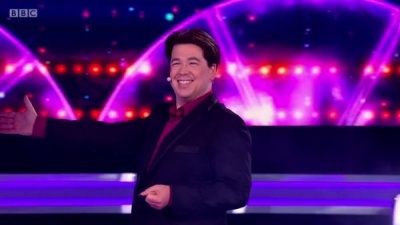 Michael made his first telly appearance on Going Live, after someone swore at a pop group. (Hungry McBear).
Michael made his first telly appearance on Going Live, after someone swore at a pop group. (Hungry McBear).
We were watching Popmaster TV and heard "The Five Star question is..." No, Ken, that is not the Five Star question, the one posed when Five Star appeared on Going Live. The actual Five Star question is: did anyone realise that your potty-mouthed caller would lead to the item running short, and you'd end up getting a young Michael McIntyre to ask a question. "How many countries have you released records in?" and the cheeky follow-up "So there's nowhere left for you to go?". Michael McIntyre is appearing on The Wheel, and interviewer Sarah Greene is on The Finish Line. Five Star were last seen watching Press Ganged with The Reynolds Girls.
Great news for all stitchers: Sewing Bee is back! (BBC1, Tue). At the other end of the series, Masterchef crowns its champion (BBC1, Wed), and it's the end of The Fortune Hotel (ITV, Mon-Thu) – we'll review this Stephen Mangan show next week.
FA Cup final next Saturday, and we know it'll go to extra time, because ITV have scheduled the Deal or No Deal special with Simon Gregson immediately afterwards – just as they did in the last two rounds, which both went to penalties.
Photos: EastEnders title card BBC, others as credited.
To have Weaver's Week emailed to you on publication day, receive our exclusive TV roundup of the game shows in the week ahead, and chat to other ukgameshows.com readers, sign up to our Google Group.


